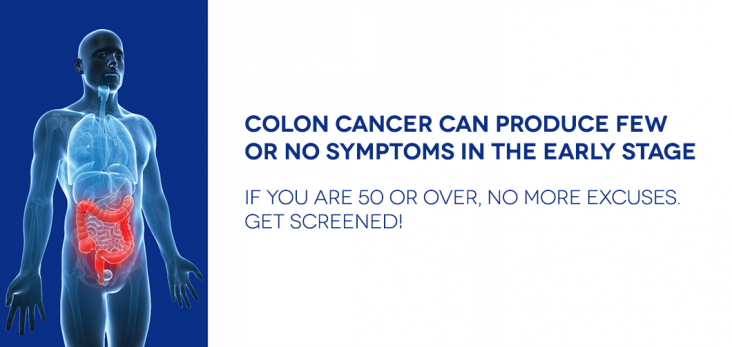There are various measures that may tell you if you are suffering from colon cancer that includes alteration of bowel habits (diarrhea, constipation etc) lasting for several days, continuous feeling that you need to go for bowel movement which doesn’t occur, dark stools with blood, rectal bleeding, abdominal pain, sustaining weakness and fatigue etc. It is highly advised that if you are suffering from any such symptoms then consult Gastroenterologist or Colorectal surgeon immediately.
Diagnosis
Certain tests may be recommended for screening of colorectal cancer.
- FOBT (Fecal Occult Blood Test) is done to examine for the hidden blood in stool.
- Sigmoidoscopy- through Sigmoidoscope the lower and rectum colon is tested to detect cancerous or any precancerous growth. They are further tested or removed for more clarity.
- Colonoscopy- through colonoscope the entire colon and rectum is tested to detect the presence of cancerous or any precancerous growth. They are further tested or removed for more clarity.
- Virtual or computerized tomography colonoscopy- through a special X-ray equipment 3-D pictures are taken out of colon and rectum and later through the arrangements of these pictures by computer shows detailed information about any abnormalities and polyps.
Treatment
Among the various methods of treating colorectal cancer, three standard treatments are:
1) Surgery – it could be called as the most effective measure as the cancer affected zone is removed through this treatment. It is highly recommended for treating local colorectal tumors.
During colonoscopy a small tumor may be removed but removing the entire area with the surrounding fats and lymph nodes is undoubtedly the best way to treat. This surgery may be performed by open surgery method or by laparoscopy as suggested by your doctor.
In a process called colostomy the waste product is collected in a bag placed over stoma which is an opening made by surgeons. After the healing of bowel colon and rectum is reconnecting through another operation. In rectal cancer permanent colostomy is essential.
Painkillers along with medicines are often provided to the patients after operation to get relief from the pain.
Nutritious foods which are rich in protein and calories are advised to the patient to heal faster.
2)Chemotherapy – this treatment for cancer utilizes drugs to arrest the growth of cancerous cells by killing them or restricting them from further division. The drugs consumed through injection or mouth directly hits the bloodstream and reach cancer cells and when it is taken through spinal column it affect the area having cancer cells.
Combination of Xeloda (Capecitabine), Oxaliplatin, 5-fluouracil and Camptosar (Irinotecan) are used to treat the diverse stages of this cancer. Directly the chemotherapy may be provided to the liver if the cancer is metastasized there. The five drugs Cetuximab (Erbitux). Bevacizumab, ziv-aflibercept, panitumumab and regorafenib is approved by FDA for treating this cancer. These drugs together arrest the protein or blood which is helping in the growth of cancer.
3)Radiation therapy – this therapy utilizes the highly advanced X-Ray or radiation to restrict or kill the cancer cells. Two methods of radiation therapies are there.
The first one is external radiation where the machine is used to send radiation from outside part of the body to the cancer affected area.
The second method called internal radiation therapy utilizes substances of radioactive which are sealed in wires, seeds, catheters, needles and are injected directly on the infected area. It is done after the surgery with the Chemotherapy to kill all the possible existing cancer cells. If the tumor of the patient had stick to another part of the abdomen or if it is present on the point of cancer which was removed then radiation therapy is highly recommended.
You can live a normal life after the treatment as per the advice of the surgeon but remember to keep a regular follow-up as suggested by your healthcare provider.







